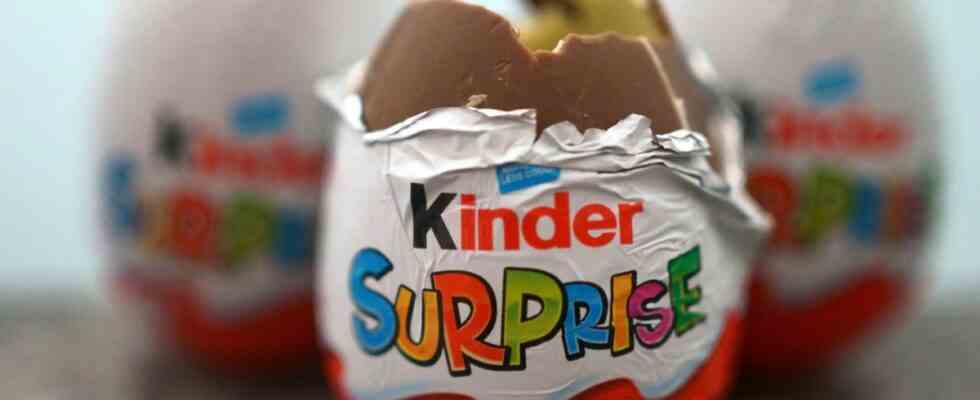The suspicion of salmonella at Ferrero is taking on a new dimension. As early as December, the confectionery giant became aware of a salmonella case in the factory in Arlon, Belgium, which has been the focus of the food authorities for days. This emerges from a communication from Ferrero France.
In Belgium, Ferrero has to stop production in a factory for the time being. The Afsca supervisory authority announced on Friday that it would revoke the production license for the Arlon factory as a result of the investigation. According to the statement, Ferrero did not provide sufficient information in the investigation. All products from the factory must therefore be recalled, regardless of their production date. According to the announcement, this includes all Kinder Surprise, Kinder Mini Eggs, Kinder Surprise Maxi and chocolate bons that were manufactured in Arlon. Afsca also asked all distributors to withdraw related products from retail outlets. The Arlon plant may only reopen once all food safety rules and requirements have been met.
According to Ferrero’s statement, on December 15, Salmonella was detected in a strainer at the outlet of two raw material tanks at the Arlon site. The products made from it were then held back. The filter has been replaced and controls on unfinished and finished products have been increased. The announcement does not explain why Ferrero did not recall the products already in circulation at the time.
In the past few days, the company has recalled products from its “kids” line of confectionery in a number of countries, including the United States, according to a company announcement released by the US Food and Drug Administration on Thursday. The German market has also been affected by the recalls of the past few days, including selected batches of “Kinder” surprise eggs, “Kinder” chocolate bons and some Easter items. These are purely precautionary measures, as the company emphasized several times. Although none of the “kids” products tested positive for salmonella, Ferrero takes the matter very seriously, “because consumer protection is our top priority.” But the mere suspicion of a salmonella infestation could leave its mark on the supermarket shelves – especially since the Easter business is considered lucrative for confectionery manufacturers.
What was the trigger for the recalls?
The consumer organization Foodwatch has criticized the company. “If such a mistake happens, the population must be warned immediately,” said Andreas Winkler from Foodwatch. Individual responsibility and self-monitoring by the manufacturers are not enough, “transparency obligations for authorities are necessary so that cases like Ferrero must be made public immediately.”
But what was the trigger for the many recalls of the past few days? At the beginning of the week, cases of salmonella were first reported in Great Britain and France. In Great Britain, it was mainly small children who contracted salmonella, a news agency reported on Monday. Shortly thereafter, Ferrero recalled some batches of Kinder Surprise Eggs. The food safety agency said the recall had “a possible link to a salmonella outbreak.” In France, too, Ferrero recalled products at the beginning of the week after 21 cases of infection, according to the health authorities in Paris. According to them, it is genetically the same salmonella that is responsible for the outbreak of disease in Great Britain and Ireland. The products are all manufactured in the said factory in Arlon, Belgium.
By working with food and health authorities in Europe, Ferrero has received new data showing a match between the salmonella cases reported in Europe and its own plant in Arlon, the company said. On Thursday, Ferrero also extended its product recall in Germany to some Christmas items. These include special surprise eggs and advent calendars, each with a sell-by date of April 20, 2022, as shown in one of the portal foodwarning.de published overview. “A salmonella disease manifests itself in a few days after infection with diarrhea and abdominal pain, sometimes with vomiting and a slight fever,” says the consumer advice center. In healthy people, the symptoms usually subside after a few days. In certain cases, however, serious illnesses can occur, especially in infants, small children, the elderly and people with weakened immune systems.

